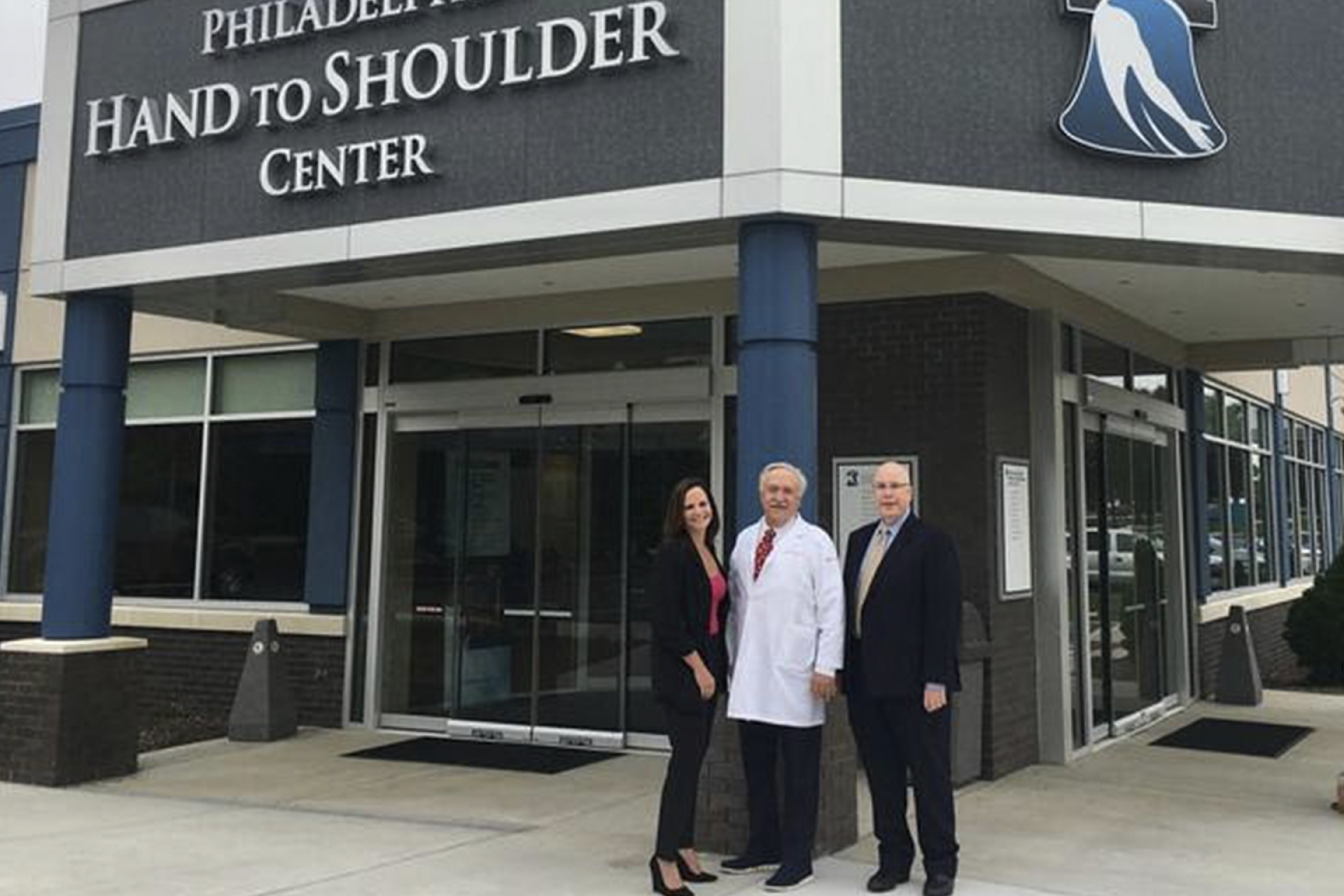
Philadelphia Hand to Shoulder Center wants to extend reach into suburbs
Philadelphia Hand to Shoulder Center executives, from left, Jennifer Kuruc, Dr. A. Lee Osterman and Andrew B. Cooney, at the practice’s King of Prussia location.
By John George
– Senior Reporter, Philadelphia Business Journal
Sep 27, 2018, 2:03pm
Already the country’s largest specialty practice of its kind, the Philadelphia Hand to Shoulder Center is looking to expand its reach.
“Over the next five to 10 years I can see us being at 50 to 60 practitioners,” said Dr. A. Lee Osterman, president of the 17-physician group. The growth would be by accomplished by adding physicians who would be affiliated with the practice.
Founded nearly five decades ago, the Center City-based Hand to Shoulder Center began opening satellite sites in the early 1990s. Today 17 hand specialists practice out of 18 offices that stretch from Wilkes Barre to Cape May, N.J.
“The doctors practice out of at least two or three different offices,” said Jennifer Kuruc, the group’s director of operations.
The practice last year handled about 155,000 individual patient visits, including 12,000 surgeries, for more than 30,000 individual patients
Andrew Cooney, executive director of the Philadelphia Hand to Shoulder Center, said two regions the practice is looking at for possible expansion are Delaware and the western Philadelphia suburbs.
Historically the specialized field of hand care has been occupied by many small “mom and pop” practices, Osterman added, but now the demands for administrative support in areas from regulatory compliance to insurance documentation and electronic health records makes it difficult for orthopaedic doctors to stay separate from a larger multispecialty orthopaedic group like Rothman Institute Orthopaedics or midsize specialty practices like the Philadelphia Hand to Shoulder Center.
The hand surgical specialty, Osterman said, is a young field tracing its origins to the 1940s after World War II when doctors returned having developing an expertise in caring for injuries to the upper extremities. Prior to that, hand surgeries were handled by general and orthopaedic surgeons.
COMING EVENT
Drs. James Hunter and Lawrence H. Schneider, two of the military surgeons, started what was originally called the Hand Rehabilitation Center over a bakery on 9th street between Walnut and Locust streets in 1970. The field continued expanding in the 1980s as procedures such as microsurgery allowed surgeons to handle more complex cases — such as reattaching severed fingers.
In 1993, when Osterman joined the group, about 22 percent of orthopaedic surgeons were employees on a salaried basis as part of a larger group or health system. Today that number is 61 percent.
Osterman said the practice — which changed its name first to the Philadelphia Hand Center and then two years ago to the Philadelphia Hand to Shoulder Center — has discussed joining a larger orthopaedic group, but the doctors have been resistant to giving up the personalized approach they can offer.
“You call these larger groups and you have to talk to a robot and press this button or that button,” he said. “When you call us you get a person. That kind of personalized care has been something we cherish.”
The group also wants to preserve its heavy involvement in research and training. The Hand to Shoulder Center, in conjunction with Thomas Jefferson University, hosts one of the longest running fellowship programs in the nation. The one-year hand and upper-extremity program has six fellowship positions.
The Philadelphia Hand to Shoulder Center has 165 employees, 60 of whom work at the practice’s newest site in King of Prussia.
Cooney said that location, previously in a small site in King of Prussia, changed with the $8.2 million acquisition of a building previously serving as Children’s Hospital of Philadelphia’s outpatient care center. Another $6 million was spent on renovations.
“We did everything,” he said. “We put in a new roof, new façade, renovated the inside and repaved the parking lot.”
Cooney said the practice is now going through the regulatory approval process to add ambulatory surgery to the King of Prussia site, which already has space dedicated to exam rooms, onsite physical and occupational therapy, imaging and minor procedures.
The practice is amid moving its Cape May Courthouse satellite office to larger space in a building it acquired. That new site is expected to open in December.
Our resident surgeon-golfer Dr. David Zelouf is featured in this piece by Chester County Life magazine about how to prevent and treat common injuries that can keep golfers off the course. READ MORE HERE

Recent Comments